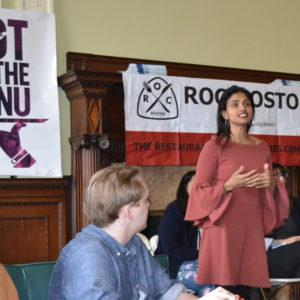For tipped workers — whether they are pouring glasses of wine at high-end steak houses or refilling coffee cups at local diners — tips determine whether or not they can pay their rent, buy groceries, and support their families. And unlike a standard wage, tips often come with a hidden price tag: devastating harassment and abuse of workers, especially women.
On March 29, our allies at Restaurant Opportunities Centers United (ROC United) rallied at the Massachusetts State House to demand the state Legislature implement a fair, living wage for all workers. Echoing the #MeToo movement, four women shared their experiences under the tipped wage system, which compromises their safety and exposes them to sexual abuse.
Under federal law, restaurant owners are only required to pay tipped workers a meager $2.13 an hour. This amount hasn’t changed in almost three decades. The rest of their income comes from tips. This means many workers’ income is almost entirely dependent on what customers choose to give them, which forces these workers, especially women, to endure abusive customer behavior.
At the Boston event, Saru Jayaraman, ROC United president and co-founder, reminded the audience that the first job many young women hold is in restaurants, where sexual abuse is rampant and normalized. Women can carry these experiences with them throughout their careers and may be less likely to stand up to sexual predators later in life.
We know it doesn’t have to be this way: All workers have the right to earn a living wage without fear of sexual harassment. That’s why ROC United launched the One Fair Wage campaign challenging the two-tiered wage system. This campaign has already won big victories. Seven states have now abolished the subminimum wage system, shifting the landscape and building momentum across the U.S. It’s clear all people benefit from a standard wage system: Restaurant workers in states with a fair wage are half as likely to experience sexual harassment at work or live in poverty. As for the argument that a wage increase for tipped workers hurts business, there is no research to support the claim.
Moreover, according to ROC United’s research, women of color in the restaurant industry face a double dose of discrimination, based on both race and gender. U.S.-wide studies and surveys focused in places such as Seattle and Miami-Dade County have shown that people of color in the restaurant industry face greater barriers, including lack of access to benefits, rejection from higher-paid “front of the house” jobs, and a greater likelihood of being handed last-minute schedule changes.
At the helm of the opposition to the One Fair Wage campaign is the National Restaurant Association – a group that we and our allies often refer to as the “other NRA.” For years, the other NRA has served as the mouthpiece for major food corporations — lobbying against increases in the minimum wage, basic health benefits for workers, and One Fair Wage legislation. Not to mention that the group recently pushed a federal rule that would have granted restaurant employers ownership over workers’ tips — perpetuating inequity and abuse even further. ROC United, Corporate Accountability, and our allies mobilized hundreds of thousands of people like you to call on your representatives to oppose this outrageous policy. And Congress acted, passing a rule to prevent managers, supervisors, and employers from taking any portion of workers’ tips.
We have the power to rein in the influence of the restaurant industry and ensure that all people can work in an environment free from abuse and harassment.
Learn more about how you can get involved in the One Fair Wage campaign.



